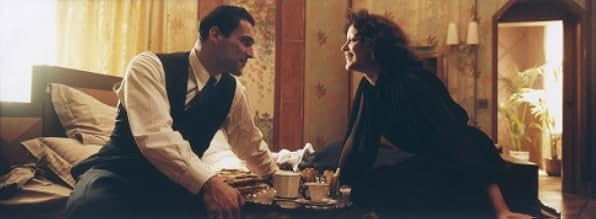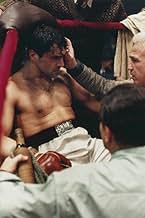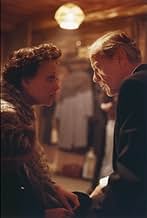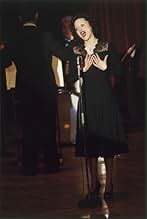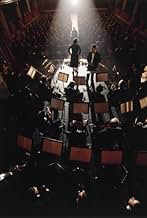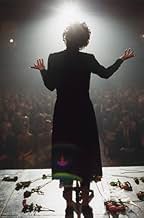Biografía de la icónica cantante francesa Édith Piaf. Criada por su abuela en un burdel, fue descubierta mientras cantaba en una esquina a la edad de 19 años. A pesar de su éxito, la vida de... Leer todoBiografía de la icónica cantante francesa Édith Piaf. Criada por su abuela en un burdel, fue descubierta mientras cantaba en una esquina a la edad de 19 años. A pesar de su éxito, la vida de Piaf estuvo llena de tragedia.Biografía de la icónica cantante francesa Édith Piaf. Criada por su abuela en un burdel, fue descubierta mientras cantaba en una esquina a la edad de 19 años. A pesar de su éxito, la vida de Piaf estuvo llena de tragedia.
- Dirección
- Guionistas
- Elenco
- Ganó 2 premios Óscar
- 48 premios ganados y 61 nominaciones en total
- Danielle Bonel
- (as Elisabeth Commelin)
- Dirección
- Guionistas
- Todo el elenco y el equipo
- Producción, taquilla y más en IMDbPro
Opiniones destacadas
I adore it. Nothing else is there to be said, really. The acting, all round, is sensational, but the lead, Marion Cotillard's portrayal of Edith Piaf, is beyond words. More astonishing even, I'd dare to say, than what Bruno Ganz did with Adolf Hitler in Der Untergang (although Ganz had only a mass murderer and historical criminal to work with, while Cotillard was dealing with, pardon me for saying, the soul of an entire nation).
I would like to comment on the script. The little symbolic moments, full of grief, full of such a profound sadness...I have never seen this done so well. Certain elements of the story, a conversation or object, are only within the lasting of the film transformed from everyday, mundane stuff into everlasting symbols of affection, of redemption and personal torment.
You see, this is the strong point of the film - it tries to(and often it manages) make you cry because of her tough life, but at the end you are crying because of the good things that happened to her. They too, are over: Edith never even regrets the bad ones.
The music is a whole story on its own. I've loved Piaf for some years now, but, alas, I don't speak French, and now, at last, I have some context to place the songs into...and it breaks me. It really does.
I saw the movie yesterday, went home, and listened to Edith's albums for hours, and they meant so much...they spoke volumes.
Anyway, the direction is perfect, although there is one scene towards the end which has problems - it tells, for the very first time, of a rather important event in the much earlier years of the singer's life , and the event in question seems to be out of place, sort of neglected - as if it should have been dealt with an hour earlier. But this is only one tiny scene, and even it, in itself, is masterfully done. Everything else is flawless.
The cuts and the singing are blended brilliantly together. I was especially struck, which is strange, by the end credits: they are very unusual and touching for a movie which is this musical (find out why!).
Anyway, my deepest recommendations. See it, it is really excellent. It is dark and human and bright, and full of spectacular music.
It is the 20th century.
I fell in love with it.
You might too.
After a very tasty $7 lunch of 'stew chicken with rice & beans' and a portion of fried plantains, I headed on up 8th Avenue. A few blocks further on I came to a cinema and decided that it would be great to see a 'movie' on a real big screen rather than the way I see most films these days through the distinctly low-def screen built into the back of the airline seat in front of me.
I was just in time to buy tickets for La Vie en Rose which was starting right away. Entering the big 'movie theater' I was shocked that at four on a Wednesday afternoon the place was packed solid. As my eyes adjusted and hunted for an empty seat I observed that I was once again the stranger - almost everyone there appeared to be over sixty. Perhaps it was the cheap day for seniors or the fact that La Vie en Rose had only opened a few days earlier but the film definitely merits a large audience.
Perhaps you are put off by foreign language films with subtitles, but to have dubbed this from French would have been a crime. It is a biopic of the life of Edith Piaf whose theme song was La Vie en Rose - literally 'Life in Pink' or more idiomatically 'The Rose-tinted Life'. Edith Piaf's gravelly voice and melodramatic life is superbly portrayed by Marion Cotillard as the film works its way through her life to the accompaniment of her distinctive songs. Of course, as in all French films which make it to the anglophone world, there is a role for THE French Actor as we often refer to Gerard Depardieu; he is the impresario who literally discovers 'the Little Sparrow' singing in the back-streets of Montmartre.
It was quite a puzzle to place each scene in chronological order as the film jumps around through more flashbacks and flash forwards than an entire season of Lost. Apart from that though, La Vie en Rose is an absolute triumph, rich with the colours of Piaf's tragic life. The entire audience stuffed damp handkerchiefs into their pockets, rose to their feet and applauded this guaranteed Oscar winner. Piaf finished her career singing a song which she felt summed up her life - "Non je ne regrette rien!" Take your friends to see this classic film and you'll have no regrets either.
Title (Brazil): "Piaf – Um Hino ao Amor" ("Paif – A Hymn to Love")
Ultimately it is a film that curiously enough does not come down to acting or story so much as it owes everything to its direction by Olivier Dahan. Audiences have been divided thus far on his efforts as they are somewhat unorthodox, but I believe he has truly done something magical with what could have fallen prey to a by-the-numbers biopic approach. In La Môme, the continuity is clipped and fragmentary at several points in the film, with scene 2 melting into scene 1 as opposed to vice versa. The story of Edith seems to fledge itself around two or three story lines simultaneously her youth, her adulthood and her last days.
Marion Cotillard, a personal favourite of mine, is perfect at each of the aforementioned stages, having met the wonders of realistic make-up but also clearly having connected with the character of Edith Piaf. As a young singer she is fumbling and bird-like, but always with raw intensity behind her performance. As an old lady (although from what I understand she was never truly that old at the time of her death) she has transformed into something else a kind of loud, hysterical diva who is alternatively self-depreciative and overbearing, her youthful humility having been quenched by years of alcohol abuse and her bird-like body and gait having been crippled by rheumatism. Only once does Cotillard vaguely emerge from her character, and it is toward the end when Edith is sitting on a beach in California giving an interview. The rest of the film she is wholly chameleon-like and indistinguishable from la môme.
Certainly this type of tragicomic drama with all of its poverty-stricken episodes and heart-rending tragedies is primed to elicit an emotional response, but Dahan goes the extra mile in polishing the story for audiences. It truly is a beautiful work of art, coated with sweeping tracking shots á la Paul Thomas Anderson or Martin Scorsese blended with shakycam to capture the fast, fickle pace of the business, endlessly creative intercutting of continuity and breathtaking scenes after another. When Piaf's beautiful hands have been noted, a muted performance is given in which the camera only focuses on her theatrics and hand gestures. Yet the best scene takes place in Piaf's apartment some 2/3s into the film in which she is waiting for her lover Marcel to fly in from Morocco. I shall give no spoilers. The film is momentarily gray and depressing, only to jerk the audience away from the misery and lose itself in a blossom-strewn pictorial style whenever Piaf goes on stage.
La Môme is a one-woman-show in all respects, with Cotillard shamelessly relegating every other cast member to the background with her emotional intensity. But in all fairness supporting characters are not given much screen time in the film, seemingly floating away from the central story eventually, or dying in some tragedy, illustrating the lonely life of its titular singer. La Môme needs to be seen to be believed, for it unexpectedly floors all other musical biopics of recent years or indeed ever.
9 out of 10
One thing about the movie that annoyed me a little was the switches of time frames. I understand the purpose of it. During the first 15 minutes we get to see the sickly little girl, then Edith Piaf's days of glory and' finally, her last days, when she was a tortured creature and looked like a 70-year old woman. So even while living through the singer's happiest days we never forget how it would end quite soon. But sometimes these switches seem unnecessary and distracting. The other flaw is that a viewer must be well-familiar with the singer's biography, otherwise it would be difficult for one to understand certain moments in the film.
I don't have much to say about the director's masterful work, honestly there is none. The director had the story of life, he had the music and the haunting voice of the great singer. The latter is what makes most of the emotional impact. But I would recommend this movie sincerely, Marion Cotillard's acting alone would make it worth watching, and there are other beautiful things in it as well. The movie never seems too long, and its last minutes are very emotional, when Edith Piaf is led to the stage, she can hardly walk, and then she starts to sing 'No regrets' and transforms completely.
¿Sabías que…?
- TriviaMarion Cotillard is one of only six actors to have won an Academy Award for a role spoken mainly in a non-English language. Sophia Loren, Robert De Niro, Benicio Del Toro, Roberto Benigni and Christoph Waltz are the other five.
- ErroresJust before a young soldier plays a song for Edith in her apartment, a supertitle reads "February 1940." An issue of "Paris Match," first published in 1949, is on the coffee table.
- Citas
American journalist: If you were to give advice to a woman, what would it be?
Edith Piaf: Love.
American journalist: To a young girl?
Edith Piaf: Love.
American journalist: To a child?
Edith Piaf: Love.
- ConexionesFeatured in Smagsdommerne: Episode #5.11 (2007)
Selecciones populares
- How long is La Vie En Rose?Con tecnología de Alexa
- Is 'La Vie en Rose' based on a book?
- How is "la vie en rose" translated?
- Why is "La Vie en Rose" listed as "La môme" in the IMDb?
Detalles
- Fecha de lanzamiento
- Países de origen
- Idiomas
- También se conoce como
- Çəhrayı rəngdə həyat
- Locaciones de filmación
- Praga, República Checa(scenes supposed to take place in Paris in the 1950s)
- Productoras
- Ver más créditos de la compañía en IMDbPro
Taquilla
- Presupuesto
- USD 25,000,000 (estimado)
- Total en EE. UU. y Canadá
- USD 10,301,706
- Fin de semana de estreno en EE. UU. y Canadá
- USD 179,848
- 10 jun 2007
- Total a nivel mundial
- USD 87,485,236
- Tiempo de ejecución2 horas 20 minutos
- Color
- Mezcla de sonido
- Relación de aspecto
- 2.35 : 1
Contribuir a esta página






